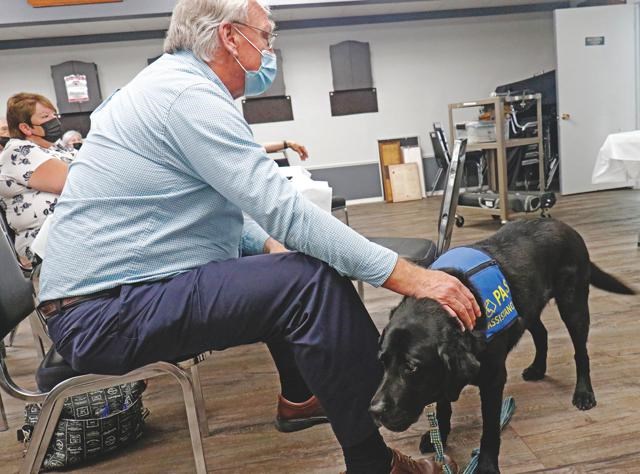Beaumont, a black Lab trained as a service dog who works with Victim Services coordinator Tara Busch, has been providing comfort to the victims of crime and trauma for seven years in Weyburn and the southeast Saskatchewan area, and is now nearing retirement.
Busch brought the black lab to the Weyburn Rotary meeting on Thursday for a presentation, and spoke about both her role and the role that Beaumont has played over the years.
Tara first met Beaumont at the Pacific Assistance Dogs Society (PADS) training facility in Vancouver, where dogs are raised and trained as assistance dogs. At the time, Beaumont was only the third dog in Canada who was certified and trained to work with a Victim Services program.
She has her office based at the Weyburn police station, but her position is funded through the Ministry of Justice, and she works to assist the victims of a crime or traumatic event when the police are called to investigate.
Beaumont travels with her when the police call for her assistance, and he will provide comfort to the victims as she works with them, as well as being there with victims if a matter goes into the court system, such as a victim of an assault, whether they are a child or an adult.
As an example, if there is a victim of a sexual assault, Tara and Beaumont are with them at the time of the incident, such as if they come in to give a statement in the “soft room”, and if there are charges laid, they are with the person right through the whole court process.
“Courts can be confusing and intimidating, so we are attending court with them if they wish, and we will appear on their behalf if they wish,” Tara explained. If a charge does go to trial or preliminary hearing, “we are the ones doing the witness preparation, and we work with the witnesses to review their statements. We work very closely with the Crown prosecutor, getting the witnesses ready for court, and we support them through this process.”
If an accused is found guilty of a charge and sentenced to jail, then her work with the victims continues, such as helping do a victim impact statement for the judge at sentencing, and when an accused comes up for parole or is released from custody.
As she’s paid by the Justice ministry, she and an assistant from the Carlyle RCMP detachment cover the entire southeast, which includes the Weyburn and Estevan city police and seven RCMP detachments. She also has volunteers in the area, two based in Estevan and one in Carnduff, who have been trained and cleared by the RCMP to help out as needed.
As a trained service dog, Beaumont can sense stress and anxiety, and if he comes into a soft room where a victim is being interviewed or is resting, he will lean up against their leg or curl up in their lap to lend support and comfort, particularly to children.
Tara met with a number of judges who cover the southeast region and was approved to bring Beaumont in as a testimony aid in court, such as if a child has to testify about something traumatic.
“It’s been a huge commitment. I didn’t really realize that when I signed up, it’s 24/7. He’s my partner, and at the end of the day he comes home with me,” said Tara. “It’s been pretty phenomenal. He has been a very, very big asset.”
Tara noted that Beaumont is approaching his retirement, as she has noticed he’s not quite as eager to go to work in the morning as he used to be, and he doesn’t like to be petted as much.
Since the COVID lockdowns in March of 2020, she and Beaumont have not been involved in any trials for the last year and a half, although they will be involved in one coming up this week.
“In the next little while, we’ll have to think about retiring Beaumont, and at that point, I will formally adopt him, and he’ll just become my office dog,” said Tara.
Beaumont has found his services called upon in the office, she added, noting that he loves children and runs up front when he hears their voices when they come into the office. In addition, there are times when officers come in from a tough shift and she’ll find him playing with them or sitting with them.
Asked if she’s spoken to students in schools about her work or Beaumont’s work, Tara noted that before COVID she had done several presentations in schools, including a series of 42 presentations around a social media campaign, “Do Not Hit Send”, plus she works closely with school counsellors anytime she is working with any students needing victim services.
About 90 per cent of referrals for her services are from the police, some are self-referrals and some come from agencies like Mental Health and Addictions.
Tara explained there is a difference between what Beaumont does as a service dog and a therapy or comfort animal, as under legislation, Tara can take him into any store or other public place.



